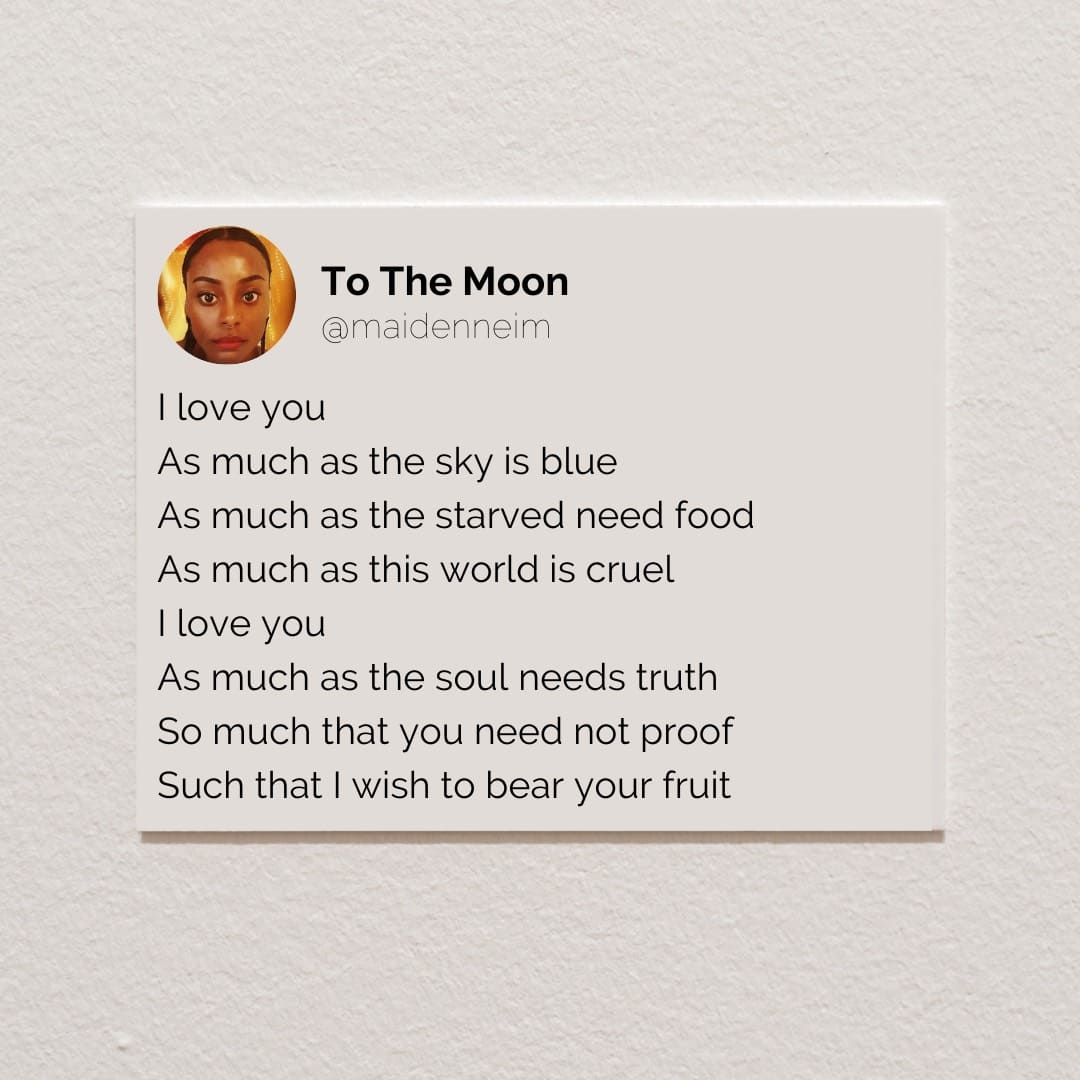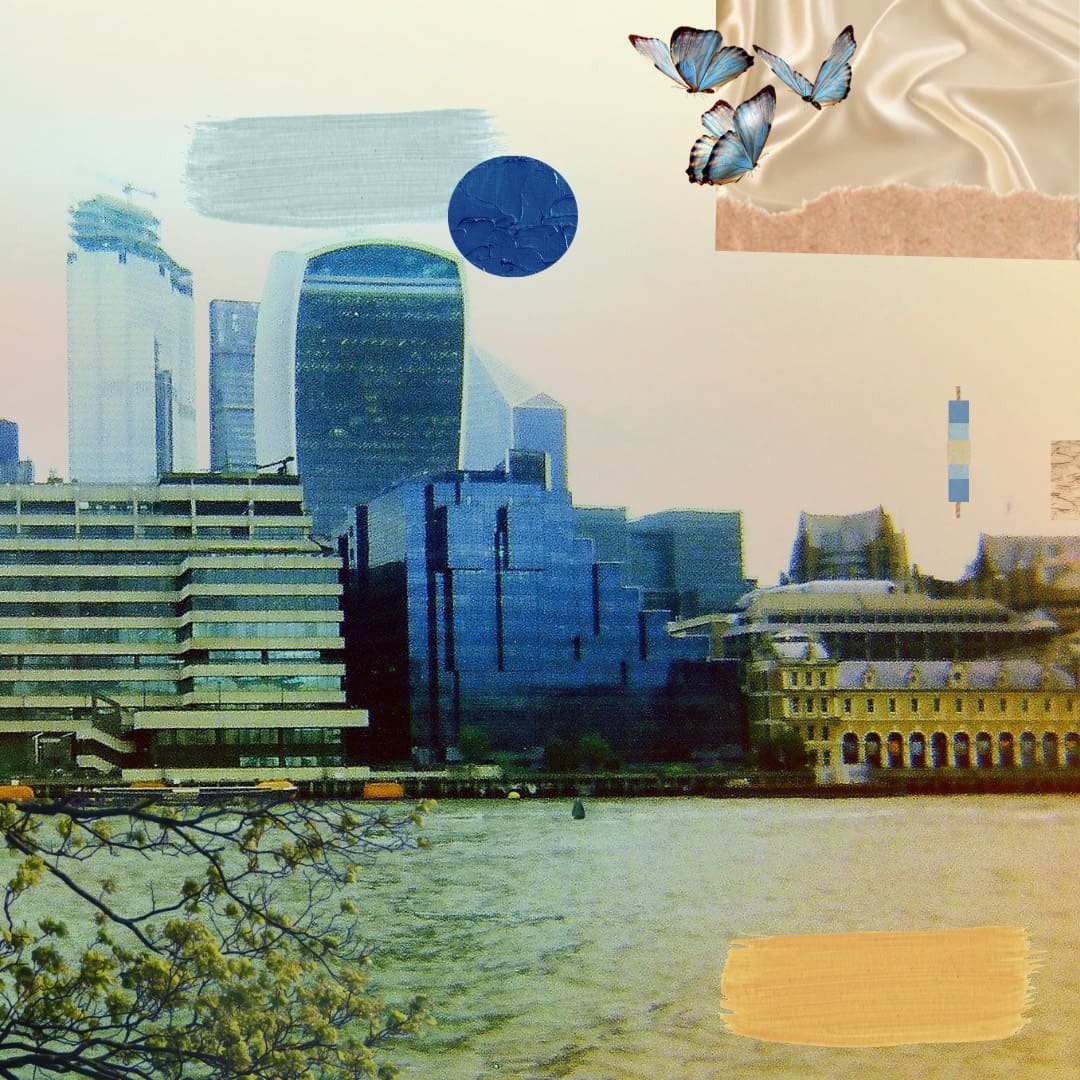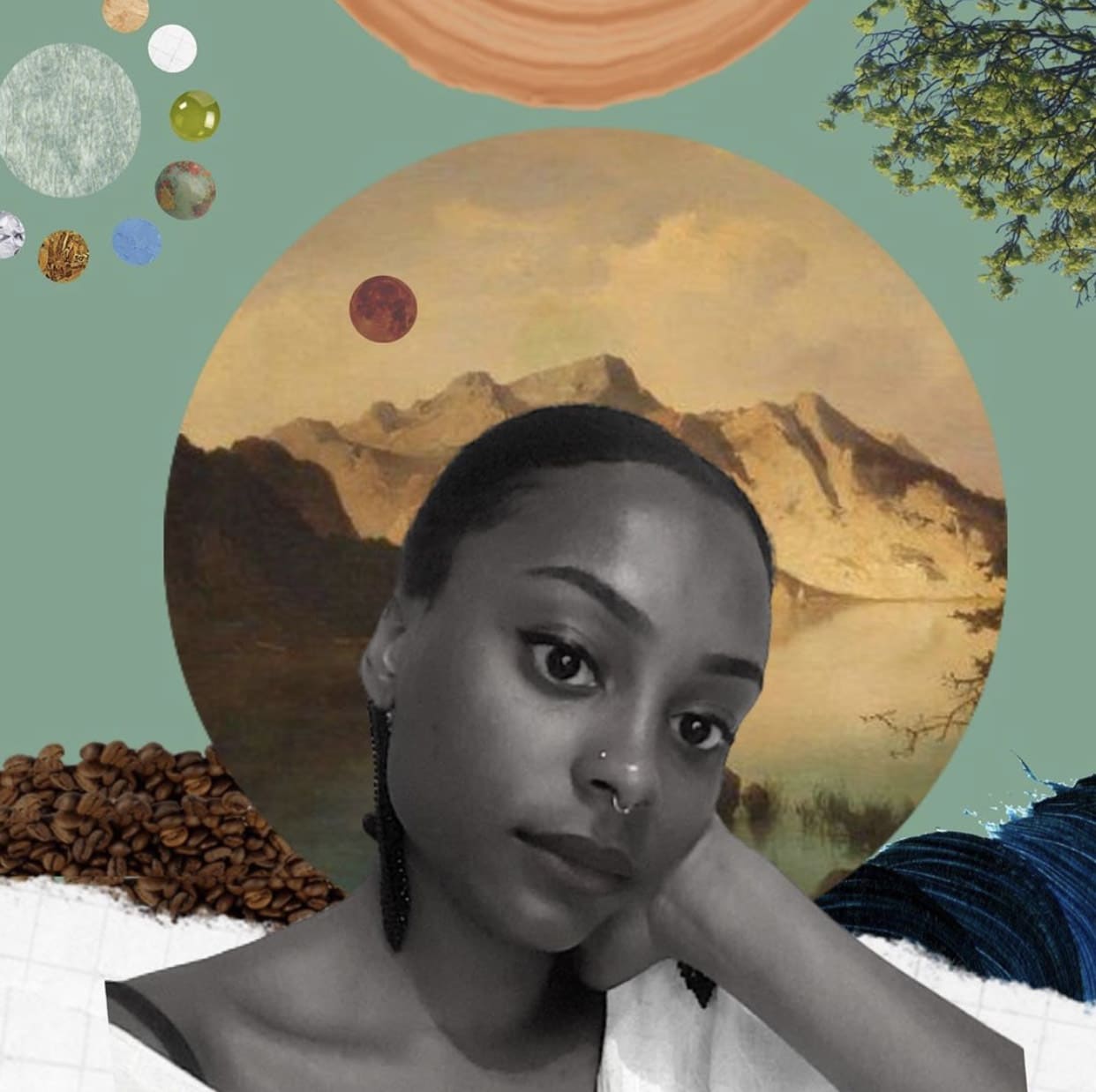Poet Maiden Neim is passionate about utilising visual language to enhance ideas and conceptual thinking. Whilst poetry is her true métier, photography and analogue and digital collage are also mediums in which Maiden evokes emotions and prioritises the exploration of identity. I spoke with Maiden to discuss her creative practice and process, influences, introspection, the Unseen Collective, and how poetry is a form of self-articulation and a way to conceptualise her identity, thoughts, emotions, feelings and experiences.
NAHUEL CONTRERASCould you tell me a bit about your creative background? What initially drew you to poetry? MAIDEN NEIMI fell into writing poetry at many stages in my life before I stuck to it. I remember writing poems in primary school on Mother's Day and immediately understood it to be a language of love. Then from my teenage years until recently, it became a way to divulge my secrets. My writing was a lot more cryptic then. I became aware of poetry as a creative ambition in Sixth Form when I joined the poetry club, and finally when I attended Creative Writing sessions at my university, it became clear to me that writing was more than a desire, it was essential to my wellbeing.
I think I have always been drawn to poetry, perhaps because I have dyslexia and find it difficult to express my emotional reality and myself. For this reason, prose is not my language of choice. Through poetry, I can make the abstract tangible by using lyric and metaphor to invite a greater understanding of my internal and external experiences. NCWho or what influences you? MNNature is my life source.
I grew up listening to a lot of grime because that is what my older brother listened to. I remember him 'spitting' 16-bars, and I loved the word play. I remember a verse of his, "I hit roadblocks – Titanic icebergs." I understood what he meant by that, without knowing what he experienced, I just felt it.
Film is my favourite art form to experience, encompassing writing, photography, music, acting, in addition to philosophy and psychology. It engages the senses to create visceral reactions and real emotions - when done right.
I am drawn to the emotional work of introspection and the theories of Psychology, which act as my aid. I find it interesting that so much of who I am is roaming in my unconscious, and when I feel something and cannot trace its origins, poetry is a map.
Love influences me the most as I think love can reconcile contradictions and root abstractions. NCYou mention that whilst your main art form is poetry, you also work in photography and analogue and digital collage. Can you talk me through this creative process and its importance to you? MNPoetry is my primary form of expression, though photography and collage aid my ability to delve into my unconscious and subjective reality to create meaning and understanding.
I believe that humans are storytellers, and the stories have created a shared understanding of the world. However, I need to create my own meanings, myths and beliefs to understand myself and live authentically.
Photography is perfect for such exploration because thinking with my feet; I walk wherever impulse takes me, and I only stop when I see or feel something. I think about what it means to me and why my feet led me there; what the particular object tells me about my past, present, future? Similarly, when creating a collage, I go on instinct and until I find the story that I am telling, the process is the outcome. NC “Maiden Neim” is a passionate and poignant piece, which addresses systemic racism and the intergenerational traumatic impact of slavery and colonialism. It also demonstrates your ability to utilise visual language to discern the elements of identity. Has poetry always been a form of self-articulation and a way to explore and express your own identity and experiences? MNAbsolutely! Poetry allows me to explore my own identity and emotional responses. For example, I can spotlight the daily micro-assaults that I would not feel comfortable raising in discussions about systemic racism and the impact of slavery and colonialism because there are more immediate issues to attend to.
The fact that I do not know my surname, my real name, is something that irks me. My name feels foreign in my mouth. That's how I got the first line of that poem "Slavery stole my father's name".
I also recognise and deeply believe that power is expressed and maintained through language. I hate the word slaves. It sounds so matter of fact and blasé as if such degradation was due to an intrinsic fault or weakness of my ancestors. I deeply believe that power is expressed and maintained through language and I would prefer the phrase enslaved people. To shift the responsibility by painting a picture of those who were free before the abduction. Taken from their beds in the night as if they didn't have dreams to dream. In this vein, they are restored of their humanity. That is why I wrote, "we were never slaves but enslaved persons".
I feel free to make such a statement in my poetry even though it may seem as if I am placing too much emphasis on the trivial and minor details.
 NC “May I”, “A Stone’s Throw”, “Wide Awake”, “To The Moon”; the way you write is so evocative, expressive and rhythmic; it reflects the art of storytelling. Did your style adapt over time, or did it come instinctively to you as a poet?
MNMy style has certainly changed over time but I have always been drawn to the sound of words. I think rhythm creates a pace and gives the poem its own life and voice.
NC “May I”, “A Stone’s Throw”, “Wide Awake”, “To The Moon”; the way you write is so evocative, expressive and rhythmic; it reflects the art of storytelling. Did your style adapt over time, or did it come instinctively to you as a poet?
MNMy style has certainly changed over time but I have always been drawn to the sound of words. I think rhythm creates a pace and gives the poem its own life and voice. When I first started writing, the words that filled the page were instinctive. However, recently I have started viewing instinct as a question in the search for meaning. Now my poems are almost a conversation between instinct and introspection, my primitive self and my evolved self. I much prefer my poetry style now. It feels personal rather than a brand identity.
NCWhat themes do you enjoy exploring? MNThe central theme of all my poetry is love.
I think all experiences that feel abstract can be grounded by the weight of love. In this way, the personal is always political.
When I write about racism, I write about loving someone and fearing that they won't return home. So you wait by the window, with your heart in your stomach. Or even when I write about my depressive episodes, I believe that finding the fight to win the war in my mind is the greatest form of love. NCI understand that you wrote “With You” whilst on a walk, and “Lamb” whilst at work. Could you describe your state of mind when writing and how your poems develop? When you are writing, where does reality stop and your imagination begin? MNI have an attention disorder, so my mind wanders a lot - too much. Every so often my mind stumbles upon an idea for a poem. For example, "Lamb" was written at around 3am. For context, I work really long shifts as a carer – 24.5 hours. My mind raced through the night and somehow settled on baby Moses. Specifically, the Bible story where his mother placed him in a wicker basket to float atop the Nile in the hope he would be saved from the murderous Pharaoh. I thought of her sacrifice to preserve her child's life. My mind decided that Moses was the little lamb, and his mother painted herself as prey to save her son. The poem became a meditation on mothers' love and sacrifice.
I would say my poems start as trains of thought or imagination but find their way into reality. As I wrote this piece, I could not help but think about mothers in war-torn countries, those who surrender themselves to war but want a better life for their children. So with heavy hearts and hope, they send them to flee persecution with 30 others on an inflatable boat made for 6 across the Atlantic. NCYour poem, ‘Tenderness’ was incredibly moving. Focusing on the tenderness of Black motherhood, surivial and society’s adultification of Black childhood. As Black artists, creating a perspective of visual resistance often runs parallel to societal and systemic issues. As an artist, do you feel a responsibility for your work to deconstruct certain narratives? MNI suppose I do feel a responsibility to deconstruct certain narratives and challenge the societal and systemic issues faced by my people. But it is a responsibility that stems from love. Love is a verb, and I take it as such. I use my poetry as protest and thus, proof of my love. NCHow have you found the last few months of lockdown from a creative perspective? MNLockdown has left me alone with my mind longer than I would have ever allowed in the past. It has been quite overwhelming and rarely conducive to my creative process. It is hard to write when I am swaddled in my duvet crying. NCHow has the Internet and social media impacted your creative practice? MNSocial media has allowed me to connect with so many artists and closet creatives. So much so, my friends and I have created a webzine to showcase their work @_unseencollective_.
However, my creative productivity has been destroyed! I waste away hours scrolling through my explore page and then boom! It's 3am. I think it is due to my anxiety-induced tendency to compare myself to others both personally and creatively, my favourite recipe for self-doubt. Additionally, I think the push for creatives to share 'content' to increase their reach has made me more anxious in regards to sharing my work. Mainly because everything is so ‘aesthetic’ and I have a hard time sharing my whole self in an aesthetically pleasing way.
 NCHow important is narrative clarity and accessibility of meaning? Should a reader or listener have to work hard to decipher the poem?
MNI like my poems to have dual meanings, they speak outwardly and to myself. It is important that my narrative remains clear and accessible to all. For one, life is hard enough; I don't want only those with the leisure to engage in deep analysis to read my work. I like the idea that if you cannot say something simply then you don’t truly understand it. For me, the reader should be able to understand the outright message of the poem but not necessarily the message I have written to myself.
NCWhat would you like your poetry to evoke in a listener or reader?
MNA feeling. I want the reader to feel my poem viscerally and connect to it emotionally, even if they haven’t had the same experiences; like when I was a child listening to love songs, and I would be in my feelings. This type of emotional resonance is the most important thing because then our hearts become open to understanding.
NCBeing a part of the Unseen Collective, could you tell me more about how the shared creative expressions of the collective have impacted your own individual practice and creative development?
MNBeing a part of Unseen Collective has made me realise that my creativity is enabled by and thrives in environments that engage with diverse artists and art forms. I was ignorant of the wealth of artists and closet creatives within my reach that I could learn from, be inspired by and work with. As I consume more art, I feel myself growing as a poet, so now I dedicate a significant portion of my creative development to consumption.
NCPersonally or professionally, what are you currently focusing on?
MNPersonally, I am focussing on gaining a better understanding of myself – my thoughts, feelings and behaviours. I suppose this directly links to and benefits my professional ambition as I am currently working towards a doctorate in psychodynamic psychoanalysis.
NCHow important is narrative clarity and accessibility of meaning? Should a reader or listener have to work hard to decipher the poem?
MNI like my poems to have dual meanings, they speak outwardly and to myself. It is important that my narrative remains clear and accessible to all. For one, life is hard enough; I don't want only those with the leisure to engage in deep analysis to read my work. I like the idea that if you cannot say something simply then you don’t truly understand it. For me, the reader should be able to understand the outright message of the poem but not necessarily the message I have written to myself.
NCWhat would you like your poetry to evoke in a listener or reader?
MNA feeling. I want the reader to feel my poem viscerally and connect to it emotionally, even if they haven’t had the same experiences; like when I was a child listening to love songs, and I would be in my feelings. This type of emotional resonance is the most important thing because then our hearts become open to understanding.
NCBeing a part of the Unseen Collective, could you tell me more about how the shared creative expressions of the collective have impacted your own individual practice and creative development?
MNBeing a part of Unseen Collective has made me realise that my creativity is enabled by and thrives in environments that engage with diverse artists and art forms. I was ignorant of the wealth of artists and closet creatives within my reach that I could learn from, be inspired by and work with. As I consume more art, I feel myself growing as a poet, so now I dedicate a significant portion of my creative development to consumption.
NCPersonally or professionally, what are you currently focusing on?
MNPersonally, I am focussing on gaining a better understanding of myself – my thoughts, feelings and behaviours. I suppose this directly links to and benefits my professional ambition as I am currently working towards a doctorate in psychodynamic psychoanalysis. Additionally, I am loosely focussing on collating poems to publish, working on a novel and screenplay.
